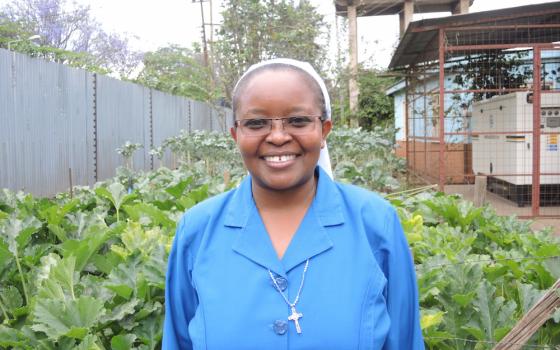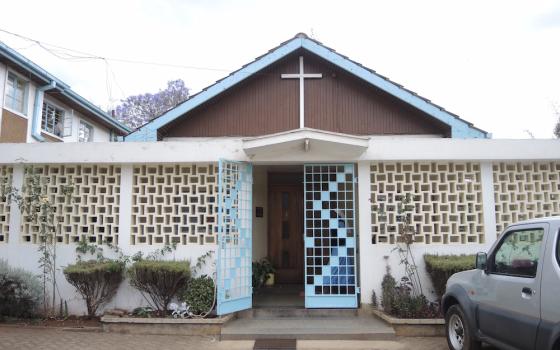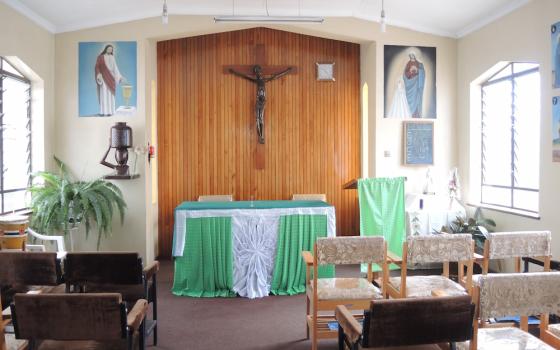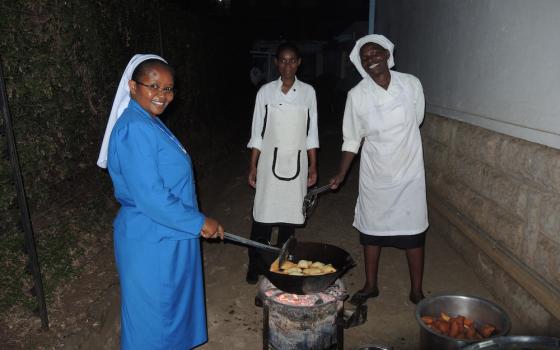Every capital city has a place like Tumaini: a hostel where sisters stay when they’re passing through or traveling abroad, taking a course, or attending a big meeting. The Tumaini Center, run by the Association of Sisterhoods Kenya, is a 40-room hostel and office space for the administration of Kenya's national association of sisters, located just off the busy Ngong Road in Nairobi. It's a meeting point, where sisters get to know other congregations as well as interact with the association leaders.
These kinds of combination hostel/offices are a reporter’s boon: So many people are passing through from far-flung parts of the country, from different types of ministries and with varied reasons for visiting the capital. In the dining hall, a young sister taking a finance course may have lunch with a senior sister from the Justice and Peace Commission who coordinates countrywide programs, providing invaluable networking opportunities for both.
The Kurasini Center in Lusaka, Zambia; the Pope John II Hostel at the Tanzania Episcopal Conference in Dar es Salaam; the Nigeria Conference of Women Religious hostel in Enugu, and the ARU (Association of Religious of Uganda) in Kampala — these places are my homes-away-from-home when I travel to report on sisters in Africa. In countries where communication can be challenging, these hostels are an essential networking tool between the association administration and the sisters themselves.
I caught up with Sr. Mercy Kariuki, an Immanuel Sister who is the director of Kenya’s Tumaini Center, to hear what it’s like to oversee a hostel that is also a melting pot of sisters.
GSR: How did you become the director of Tumaini?
Sr. Kariuki: It never occurred to me that I would manage a hostel. Before I became a sister, I did a certificate course on food and beverage management with Opus Dei [an organization for lay people associated with the Catholic church]. After I became a sister, however, I was posted to a school where I was a school matron [supervisor of dorms] at a girls' boarding school for high school. I did that for six years and then I went to manage one of our Catholic bookshops. I also did pastoral work. I used to work with small Christian communities. When my superiors told me to go back and further my education, I thought they wanted me to train to be a teacher. But they said, 'You’re going to work with AOSK in their hostel.' I thought to myself, that's pretty good, because I'm going to make use of my hospitality course!
Do you have advice for other sisters working in hospitality?
Sisters need to check the environment and decide their target groups. If she's targeting sisters only, it could be a good idea to open it up to lay people or to offer conference space. That means they're not focused on one area, and anyone can host a conference or a seminar there. Also, she needs to be able to offer the standard services that you find in any hospitality establishment, depending on the country.
Lastly, it's important to budget. The little money that we get we try to save. We also try to make use of every small part of the compound, so we can grow vegetables and don't need to buy them. We haven't had to buy cucumbers at all in the past two months because of our harvest. We can also offer our guests fresh vegetables.
Why is Tumaini connected to AOSK?
We are an income generator for AOSK, and we help with running the secretariat. Sisters need affordable places to stay [in Nairobi]. We could fill this place in a snap, even if it were five times bigger — even if we had 200 rooms we could fill it! We'd like to expand by rebuilding some of our one-story buildings, but we're still looking for funds.
How does having a hostel on the grounds help AOSK?
It is beneficial for AOSK because sisters may not know everything that is happening within the secretariat. For example, now we have a new project called SCORE ECD. [Read a Q&A with Kenya’s SCORE ECD director, Sr. Jane Wanjiru.] When they are here, sisters can inquire more about different activities that take place within the secretariat. We also host the Justice and Peace office, so sisters get to know what that office does within the country. It's also beneficial for the sisters. From time to time I see the executive secretary talk to the sisters and introduce them to different things she feels are important to them.
What have you learned while working at Tumaini?
One thing I've learned is patience and persistence. You have to be very patient because you're dealing with different personalities and different people with different temperaments. I have to tolerate everyone that comes and listen to their stuff. Even if I don't want to listen, I have to do it.
It has also been a time of growth for me, especially because now I am not living with members of my congregation. I am able to see and embrace the richness of the other congregations and what they do. I have learned a lot, I’ve been able to network with so many congregations. Not just Kenya — we get sisters from Zambia, Tanzania, South Sudan and Uganda.
The best part is I've been learning from the sisters about so many different things and different cultures. We're 42 tribes in Kenya, so we’re able to mingle with sisters from different tribes in Kenya, which is really enriching. Working at Tumaini has really shown me that I can work anywhere, not with just sisters of my own congregation, but also sisters from other congregations.
[Melanie Lidman is Middle East and Africa correspondent for Global Sisters Report based in Israel.]




